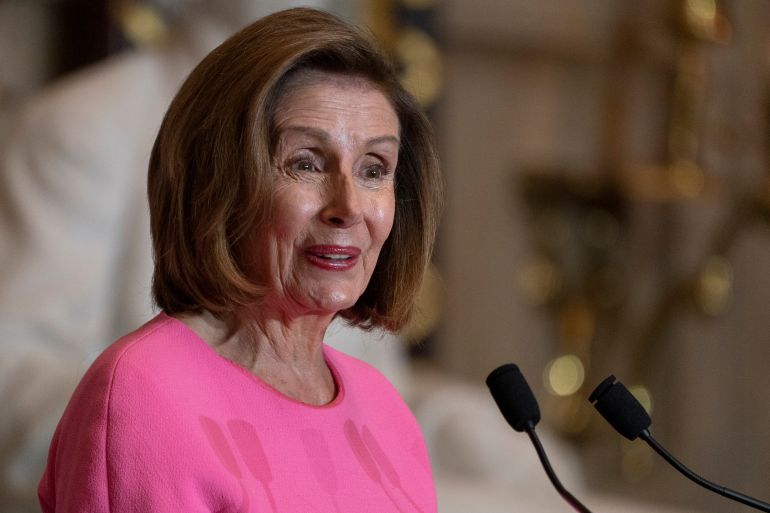US House Speaker Nancy Pelosi to visit Taiwan: Reports
Pelosi could become the first sitting speaker to visit the self-ruled island claimed by China in 25 years.

Speaker of the United States House of Representatives Nancy Pelosi is due to visit Taiwan in August, according to new media reports, which would make her one of the highest-ranking officials from the US to visit the self-ruled island democracy in decades.
The reports on Tuesday angered China, which said the US would bear the consequences of such a trip. China’s Communist Party in Beijing regards Taiwan as its sovereign territory, although it has never directly ruled the island.
Keep reading
list of 4 itemsTaiwan sends jets to warn off Chinese planes in air defence zone
China vows to ‘fight to the end’ to prevent Taiwan’s independence
US defence secretary chides China over ‘provocative’ behaviour
Pelosi was originally scheduled to visit Asia in early April, but her trip was delayed when she contracted COVID-19. While the focus of that trip was on Japan, it reportedly included a stop in Taiwan.
The Financial Times, citing six sources, reported on Tuesday that the trip is now scheduled for next month.
The American Institute in Taiwan, the de facto US embassy, did not immediately respond to comment.
Taiwan’s Ministry of Foreign Affairs said it had “not received relevant information” about the trip but said that it welcomes visits by Americans from “all walks of life.”
Local media reported that independent legislator Freddy Lim invited Pelosi to visit again during a summit on Tibet in June.
If her trip goes ahead, Pelosi will be the first sitting speaker of the House to visit Taiwan since Newt Gingrich travelled to the territory in 1997 to meet then-President Lee Teng-hui.
The timing of Gingrich’s trip was noteworthy as it came a year after Taiwan’s first democratic elections were held in 1996, a considerable milestone for the island.
Pelosi’s expected visit will take place at a significant low point for US-China and China-Taiwan relations. China is also preparing for its all-important Party Congress in October and the 95th anniversary of the founding of the People’s Liberation Army on August 1.
China’s foreign ministry said on Tuesday that a visit to Taiwan by Pelosi would seriously undermine China’s sovereignty and territorial integrity, and the US would bear the consequences of its response.
Speaking at a regular press briefing, Chinese foreign ministry spokesman Zhao Lijian said China would take strong measures to safeguard its sovereignty and territorial integrity.
Foreign Minister Wang Yi said in April that a visit by Pelosi would constitute “gross interference in China’s internal affairs” during a conversation with Emmanuel Bonne, diplomatic adviser to French President Emmanuel Macron.
Wang Yi further said the trip would send “an extremely dangerous signal to the outside world”.
The same reaction can be expected again, said Wen-Ti Sung, who teaches at the Australian National University’s Taiwan Studies programme. He also predicted that China might signal its discontent by sending People’s Liberation Army planes into Taiwan’s air defence identification zone (ADIZ), a stretch of land and sea along the Chinese coast monitored by the military.
“Beijing will likely warn against potential collusion between US and Taiwan’s ruling DPP, possibly coupled with increase in PLA warplanes activities near Taiwan’s ADIZ. That will publicly register Beijing’s displeasure, but may be plausibly interpreted more as aimed at deterring Taiwan, than protesting against an American congressional leader,” he told Al Jazeera.
China’s ADIZ flights have escalated in the past two years, and it sent nearly 150 aircraft – a record number – towards Taiwan ahead of the island’s national day on October 10 last year.
While the US does not maintain formal diplomatic relations with Taiwan, whose formal name is the Republic of China, it is the democracy’s most important ally.
The relationship between the two governments has fluctuated over the decades but they grew closer under President Donald Trump and have remained close under President Joe Biden.